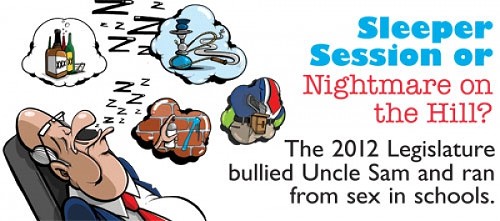2012 Utah Legislative Recap
Sleeper Session or Nightmare on the Hill?
By Eric S. Peterson @ericspetersonIf there’s one thing the legislators of the 2012 session are losing sleep over, it’s the 2011 session. That was the year lawmakers tried to simultaneously dogpile on undocumented immigrants, sneak-attack Utah’s open-government-records laws and duke it out with the federal government. Still weary and shellshocked from 2011, it’s no wonder lawmakers wanted the 2012 session to be such a tranquil and sedate affair. But even if it seemed like the Legislature slept through the session by sidestepping major issues such as immigration, liquor-store privatization and other hot-button issues, plenty of other bills will make for a rude awakening for Utahns when they become law.
For better and worse, the Legislature ground out some potent laws to govern Utahns going forward. Lawmakers found the money to help cover young autistic children, but at the same time, ensured Utah schools will be limited to teaching abstinence-only sex education, even if a student asks about contraception. While the House took a sincere, but unsuccessful crack at repealing driving-under-the-influence checkpoints over constitutional concerns, another bill passed both houses to allow the repossession of public lands from the federal government—which legislative staff have outright said would get the state sued on constitutional grounds. And while legislators railed against the tyranny of Uncle Fed, they nonchalantly turned around and stuck it to local governments—Salt Lake City government in particular—with laws meant to squash local control over idling ordinances, e-billboards and other measures.
The 2012 session goes to show that Utah voters can’t even get a little rest during a sleeper session—unless they want to wake up to regret it.
The Vice Squad
Keeping an Eye on the Booze Biz
Utah drinkers can drink with minds and livers untroubled by the Legislature’s antics this year. The totality of the Legislature’s teetotaling this session has had little impact on Utahns’ ability to get a drink, but rather focused on efforts to improve oversight of the Department of Alcoholic Beverage Control, which has been wracked with controversy since evidence of mismanagement and graft was reported in 2011.
That’s why Sen. John Valentine, R-Orem, passed Senate Bill 66, which would increase oversight by adding two members to the liquor commission and create a special audit division that reports directly to the oversight liquor commission.
Rep. Ryan Wilcox, R-Ogden, passed House Bill 354, which would for the first time create a centralized location for alcohol-crime statistics to be gathered so that politicians can make decisions based on facts rather than conjecture. Cheers to that.
Drinkers can also raise a glass to Rep. Brian Doughty, D-Salt Lake City for attempting to pass a bill that would require at least two members of the liquor commission to be drinkers. That bill at least made it through the House before being cut off by the Senate.
Stop for DUI Checkpoint
Rep. David Butterfield, R-Logan, proposed House Bill 140 to remove driving-under-the-influence checkpoints from the state, arguing the evidence doesn’t show the stops have helped prevent DUIs and are constitutionally questionable. While the bill had strong support with House leadership, the bill was stopped and turned around by the Senate.Hookahs on Hold
There’s some good news for the Huka Bar & Grill, as well as those who like their vices inhaled in the presence of friends, strangers and waitresses. A move to ban hookahs has been put on hold for five years. The proposed prohibition would also extend to e-cigarettes, which are water-based and therefore can currently be smoked inside public buildings. The Legislature figured that in five years’ time, the science would be far enough along to verify the need to put the bubbly hookahs and the smoke-free e-cigs on the list of items prohibited by the Utah Indoor Clean Air Act.
Graffiti Pre-Crime Bill Defeated
Computer hackers who have had the technological ability to break into government websites did so for the first time publicly in protest of Senate Bill 107 (sponsor: Sen. Karen Mayne, D-West Valley City), which would have made it a crime to be caught with graffiti paraphernalia at the wrong time and place. Ostensibly, the bill was designed to give law enforcement the power to level a ticket on someone contemplating a blank wall at 2 a.m. with spray-paint can in hand.
A group called Anonymous hacked into the Salt Lake City Police Department’s website in protest of the bill, apparently oblivious of the fact that Mayne is from West Valley City. Regardless, the bill never made it out of the Senate.
Dr. Feelgood
Nobama Care
Senate Bill 208 (sponsor: Sen. Stuart Adams, R-Layton), which seeks approval from Congress to allow Utah to join four other states in opting out of federal health care, is more than just a legislative middle finger to President Barack Obama’s landmark 2008 health-care reform, known as the Patient Protection and Affordable Care Act. According to supporters, it’s another example of a Utah solution to a blanket federal approach; to Democrats, the bill is dangerous even as a message bill. Luckily, however, the compact of states, including Utah, that want to secede from the health plan would have to get approval from Congress first.
Prognosis for Congress to re-write national health care for the sake of five states: not good.
Autism Coverage Pilot
But if there were one program that could show the feds that Utah knows how to take care of its own when it comes to health care, it’s House Bill 272 (sponsor: Rep. Ronda Menlove, R-Garland). Menlove helped move this legislation to provide health coverage for as many as 750 kids in Utah between the ages of 2 and 6 who have autism. The children would receive as much as $30,000 a year to cover intensive one-on-one treatment that will save the state immensely in the long run by getting them the care they need to help them integrate into society, rather than just getting dumped into costly permanent-care services once they turn 18.
The $6 million that was scraped together to fund the two-year pilot program is testament to the advocacy of mothers of autistic children who have been fighting for the coverage for years—and to the work of bill sponsor Menlove and Speaker of the House Becky Lockhart, R-Provo, who wielded her gavel with impunity to secure the funding.
Top 5 Tweets
Highlights from the 2012 Legislature in under 140 characters
@RobertGehrke: “Next up Rep. Chris Herrod’s HCR1: Letter to the Federal Government: ‘Dear Federal Government…you are a fat jerk’ #utpol #utleg” Feb. 29
@BenMcAdams: “Top-ten signs you’re a Dem in the #utleg, #8: When you speak on a bill, Eagle Forum kids in the balcony are told to plug their ears. #utpol” March 8
@GOPTodd: “Hatch reassures the #utleg that he believes in them and listens to them. He spent almost all of his time answering one question.” Feb. 24
@DaveMontero: “Gold resolution passes. If Flavor Flav moved to Utah, his money would literally be where his mouth is.” March 2
@BenMcTastic: “Top 10 Capitol Pick Up Lines, #1 “Let’s suspend the rules and caucus at my place.” #utleg #utpol” Feb. 14
Think of the Children!
No “C” Word Allowed in Classrooms
Condoms! Contraception! These are just a few of the taboo words that Utah teachers will be unable to utter during any sex-education course happening in schools, thanks to House Bill 363 (sponsor: Rep. Bill Wright, R-Holden).
Wright argued that if a school chose not to teach sex ed at all, it wasn’t a big deal since it’s “not like all our students are going to die if they don’t learn promiscuous behavior.” Not to be outdone by that sound bite, Gayle Ruzicka, founder of the conservative Eagle Forum lobby group, likened teaching about contraception to schools sending the message that certain drugs were OK: “Just say no to sex outside of marriage,” Ruzicka said. And just to round things out, committee member Rep. Lavar Christensen, R-Draper, noted sex education wasn’t necessary since “The Earth has been populating itself fine on its own for centuries.”
Utah’s sex-education has always been abstinence-focused, meaning that abstinence was the only measure taught and advocated for in preventing sexually transmitted diseases and unwanted pregnancies. If a child asked about contraception, however, the teacher could discuss the subject. But not anymore; now, discussion of contraceptive measures is prohibited, and schools also have the option of dropping sex ed entirely.
The bill language didn’t specify, but presumably if a child asks about contraception or topics such as homosexuality or sex outside of marriage, the teacher is to feign ignorance and push a panic button to summon masked men to remove the child from the classroom for immediate re-programming. The sex-ed bill passed with little discussion (see “Silence!” p. 18).
Of the legislators who did speak against the bill, many were teachers who argued that their colleagues were out of touch with the world Utah’s students live in. If only there were a way to make lawmakers go down to the schools and see what it’s really all about …
The Bill That Didn’t Pass That Would Have Forced Lawmakers to Go Down to Schools
Senate Joint Resolution 26 initially asked lawmakers to spend 16 hours in Utah schools, but after some tweaks, it became a resolution simply encouraging lawmakers and state school-board members to visit schools and report their findings on a website so all voters could see who was doing extra credit as elected representatives and checking out the schools. Then the Senate decided that even that was too much work and killed the resolution.
Speaking of Sex
Abortion Delays
By Katherin Nelson • comments@cityweekly.net
Utah is now tied with South Dakota for having the longest abortion waiting period in the nation, thanks to House Bill 461. The bill, sponsored by Rep. Steve Eliason, R-Sandy, tripled the waiting period between the state-required counseling session and a scheduled abortion from 24 hours to 72. Abortion clinics are not fun places to visit. They’re always dark, the staff isn’t chipper and the reading material and waiting-room “art” is always stale. Aside from the zealous “death camp” protesters clamoring outside the clinic, people who go to abortion clinics usually aren’t excited to be there, and they’re not enthusiastic about the prospect of returning. HB461 originally called for all counseling sessions to be held at abortion clinics. This required women seeking abortions to visit the clinics at least twice over three days in order to be provided with the procedure. However, that provision was removed from the bill to make accommodations for women in rural areas with limited access to clinics. But the result is still the same: Women are forced to make two trips to a clinic and spend three days mulling over the information spoon-fed to them at the doctor’s office. For a state full of folks constantly rallying for smaller government, they sure like the government’s big presence between a women’s uterus and her doctor.
More by Eric S. Peterson
-
The Secret Sauce
How Utah lawmakers disclose—or don't disclose—conflicts of interest.
- Feb 14, 2024
-
Police departments in Salt Lake County spent almost $20 million on civil rights complaints in the past decade
The Co$t of Mi$conduct
- Oct 18, 2023
-
Women decry harassment and toxic culture at St. George auto dealership
Men at Work
- Oct 11, 2023
- More »
Latest in Cover Story
Readers also liked…
-
Forget the family pedigree—Robert F. Kennedy Jr should not be the next president of the United States
Trojan Horse
- Jun 21, 2023
-
Women decry harassment and toxic culture at St. George auto dealership
Men at Work
- Oct 11, 2023








